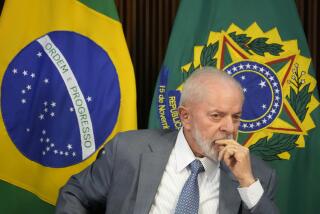Brazil’s diplomacy on Iran points to larger ambitions
- Share via
Reporting from Sao Paulo, Brazil — At first glance, it is hard to see why Brazil, a country better known for beaches, soccer, and carnival, would want to get involved in the complex business of brokering deals on Middle Eastern uranium enrichment.
The answer has less to do with Iran or nuclear weapons and more to do with the rise of developing nations and their place in the new global heirarchy.
Brazil feels like it doesn’t get the respect it deserves, even as one of the world’s most prominent emerging countries. And under President Luiz Inacio Lula da Silva, whose second and final term ends this year, it has gone all out to garner attention as a serious nation.
Lula stepped front and center into one of the most sensitive of diplomatic debates — featuring the toxic relationship between Iran and the United States — in helping broker an agreement announced this week under which Iran will ship much of its nuclear fuel to Turkey in exchange for fuel rods.
The announcement was accompanied by photographs of Lula with Iranian President Mahmoud Ahmadinejad and Turkish Prime Minister Recep Tayyip Erdogan joining upraised hands. For some, the deal and the images represented refreshing diplomacy. Others, such as those who favor U.S.-led efforts to impose more economic sanctions against Iran, remained concerned about Iran’s nuclear program.
“I think the basic reason for this is that Brazil wants to be recognized,” said Rubens Ricupero, a former diplomat and one-time secretary general of the United Nations Conference on Trade and Development.
“Brazil always thought it should be a global diplomatic player and that has been the case in trade and climate talks,” Ricupero said. “In the case of Iran, I think it is the first concrete example in which that same desire to be a global player has manifested itself politically.”
Like many people who grew up in Latin America in the latter half of the 20th century, Lula has resented the power wielded by Europe and the United States and that distaste has only grown with an economic crisis he believes has its roots in unfettered capitalism.
Brazil, with a large and stable economy and a host of vital commodities, has formed alliances with emerging powers such as South Africa and is a key member of the BRIC group of developing nations. It craves a permanent seat on the Security Council and wants a reform of the IMF and World Bank. Under Lula, Brazil has gradually abandoned its non-interventionist foreign policy and is taking a more hands-on role.
“For Lula, the Iran thing isn’t important as such,” said Oliver Stuenkel, a visiting professor of international affairs at the University of Sao Paulo. “He’s making a broader argument that current structures of global governance are unjust, and that emerging powers should have a greater say.”
Critics counter that Lula has delusions of grandeur and say his successful presidency and high approval ratings have led to hubris.
They say Lula, once a beacon for Brazil’s progressives, has declared himself above the law and now criticizes the news media for investigating corruption and has been fined three times for illegally campaigning for his successor. Worse, they say, is that the former union leader jailed for demanding human rights now frequently turns a blind eye to abuses by leftist dictators in the region.
“It is with the most profound sadness that I see you embracing the incarnation of everything that denies human rights, social justice and all the good that liberation trade unions stood for,” Denis MacShane, a former British minister for Latin America, wrote in an open letter to Lula this week.
“The picture of you alongside the Iranian tyrant, President Mahmoud Ahminedejad, as if he was the best friend of democratic Brazil, has shocked all democrats around the world,” MacShane wrote. “This man presides over a regime that tortures, kills, imprisons and humiliates those of its citizens who dare to call for freedom and democracy.”
But while critics abhor his chumminess with dictators, Lula believes he offers an alternative channel of communication with marginalized leaders. The legitimacy gained from constantly championing the underdog, as well as his personal charisma, opens doors that would be shut to others, both friends and foes agree.
At home, his policies have helped millions of poor Brazilians, while abroad he has challenged the established powers, such as when he told then British Prime Minister Gordon Brown that the economic crisis had been caused by “white, blue-eyed” bankers.
Lula is generally warm and sociable and even the dourest of his peers can be disarmed by his wit and charm.
“Lula is not ideological, he is pragmatic,” said Rubens Barbosa, a former Brazilian ambassador to the United States. “He was a unionist and what he did more than anything in life was negotiate, with heads of businesses, between rich and poor, between developed nations and underdeveloped nations. He has that vision.”
More to Read
Sign up for Essential California
The most important California stories and recommendations in your inbox every morning.
You may occasionally receive promotional content from the Los Angeles Times.












